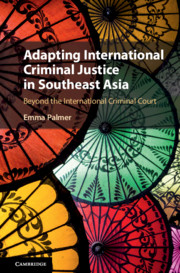Book contents
- Adapting International Criminal Justice in Southeast Asia
- Adapting International Criminal Justice in Southeast Asia
- Copyright page
- Dedication
- Contents
- Tables
- Acknowledgements
- Cases, Laws, and Treaties
- Abbreviations
- 1 Localising International Criminal Justice in Southeast Asia
- 2 Engaging with International Criminal Law alongside an Internationalised Tribunal
- 3 Implementing International Criminal Justice
- 4 Engaging with International Criminal Law as a Non-State Party
- 5 International Criminal Justice in ‘Transition’
- 6 Adapting International Criminal Justice in Southeast Asia
- Book part
- References
- Index
2 - Engaging with International Criminal Law alongside an Internationalised Tribunal
Cambodia
Published online by Cambridge University Press: 28 April 2020
- Adapting International Criminal Justice in Southeast Asia
- Adapting International Criminal Justice in Southeast Asia
- Copyright page
- Dedication
- Contents
- Tables
- Acknowledgements
- Cases, Laws, and Treaties
- Abbreviations
- 1 Localising International Criminal Justice in Southeast Asia
- 2 Engaging with International Criminal Law alongside an Internationalised Tribunal
- 3 Implementing International Criminal Justice
- 4 Engaging with International Criminal Law as a Non-State Party
- 5 International Criminal Justice in ‘Transition’
- 6 Adapting International Criminal Justice in Southeast Asia
- Book part
- References
- Index
Summary
The Extraordinary Chambers in the Courts of Cambodia (ECCC) was established under Cambodian law in 2004, but also operates pursuant to an agreement with the UN. The ECCC has convicted defendants for charges including genocide, crimes against humanity, and grave breaches of the Geneva Conventions. This may appear to indicate that Cambodia’s leaders have accepted the norm of international criminal justice, at least for historic crimes. Yet the reality is more complex. This chapter examines the history of international crimes trials in Cambodia. It shows that Cambodia does not provide an example of linear progression towards acceptance of the norm of international criminal justice, but neither is there only stalling or complete rejection of this norm. It then demonstrates how international and Cambodian government actors and civil society have sought to influence Cambodia’s laws and institutions for investigating and prosecuting international crimes, before examining each of these mechanisms. This chapter argues that Cambodia’s interaction with international criminal justice disturbs any assumption that international law norms are diffused over time and from certain locations outside Cambodia (spaces) to within the country (direction).
Keywords
- Type
- Chapter
- Information
- Adapting International Criminal Justice in Southeast AsiaBeyond the International Criminal Court, pp. 29 - 71Publisher: Cambridge University PressPrint publication year: 2020

